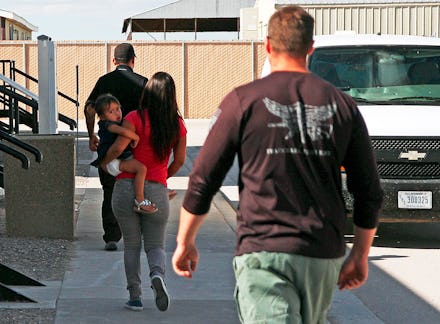A Texas Judge Just Halted Obama's Immigration Action to Shield Millions From Deportation

In a ruling delivered late Monday, a federal judge in Texas temporarily sided with 26 states suing to block President Barack Obama's sweeping executive actions on immigration. The decision, which will be revisited in the coming weeks, suspends two programs that could protect as many as 5 million people living in the U.S. without legal permission from being deported.
The first, which would have expanded the reach of the Deferred Action for Childhood Arrivals (DACA) program to cover people over the age of 30, was scheduled to begin enrollment on Wednesday. Young immigrants living under previously implemented DACA protections will not be affected by Monday's ruling.
The other program, called Deferred Action for Parents of Americans and Lawful Permanent Residents (DAPA), would offer the same benefits (rolling three-year deportation deferrals and the offer of work permits) to the parents of U.S. citizens (provided they have been living in the country for the past five years) and legal residents. DAPA was scheduled to launch in late May.
"The Supreme Court and Congress have made clear that the federal government can set priorities in enforcing our immigration laws — which is exactly what the President did when he announced commonsense policies to help fix our broken immigration system," the White House said in a statement released early Tuesday morning.
But District Judge Andrew Hanen, a conservative critic of the administration, argued in a memorandum accompanying his decision: "[The Department of Homeland Security] does have discretion in the manner in which it chooses to fulfill the expressed will of Congress. It cannot, however, enact a program in which it not only ignores the dictates of Congress, but actively acts to thwart them."
The 26 states opposing Obama's actions say that the cost of providing school and medical care to the immigrants protected by expanded DACA and DAPA represent a material "injury" to their rights. Other groups, many of them filing briefs with the court as this case unfolded, pointed to economic benefits accrued by cities and other municipalities who thrive on their labor.
What happens next? Hanen's decision is temporary, but it suggests that he will rule that Obama's programs exceed his executive power. The lawsuit, filed by Texas Republican Gov. Greg Abbott back when he was the state's attorney general in December 2014, claimed it would be "difficult or impossible to undo the president's lawlessness after the defendants start granting applications for deferred action." That process cannot begin with the court's injunction in place.
The Obama administration is now expected to take the case to the Fifth Circuit Court of Appeals, which, most legal experts agree, will almost immediately overrule the Texas court's decision. With Hanen's official ruling expected in the coming weeks, there is a good chance the delay to the president's new immigration policy will be relatively brief.
Chilling effect? If, as expected, the federal appeals court sides with the White House, the plaintiffs will likely take the case to the Supreme Court. That process could drag on much longer, essentially leaving anyone who signs up for the program in a bizarre legal limbo.
For immigrants living in the country without permission, the prospect of formally registering with a government that could pull back its offer of safe harbor with a single court ruling will be unnerving.
As L.A. Mayor Eric Garcetti (D) told National Journal in January, a prolonged legal battle over Obama's initiatives could create a "chilling effect" among the people they were structured to protect.
"The lawsuits and legislation are partly about scaring immigrants into not coming forward and partly about pandering to the deportation-only wing of the Republican party," Rep. Luis Gutierrez (D-Ill.) said in a statement to the Huffington Post two weeks ago.
Hanen put those fears to paper in his ruling Monday night, warning, "There may be dire consequences for [immigrants] if DAPA is later found to be unconstitutional. The DHS — whether under this administration or the next — will then have all pertinent identifying information for these immigrants and could deport them."
"A dream deferred": To see who actually benefits from the court's decision, simply look to the U.S. Congress in Washington, D.C. Republicans in the House voted to cut off funding to the DHS if Obama's immigration policies were carried out.
But the plan was a political dud. Democrats were more than happy let the Congressional GOP take the blame for shutting down the department. Indeed, a new CNN poll out Tuesday morning found that 53% of Americans would blame Republicans for shutting down DHS. Only 30% see the coming impasse as Obama's doing.
With the deadline to fund DHS set for Feb. 28, and the legal battle sure to drag on much longer, Republicans have indicated that they will be more likely to back down and accept.
"My objection to the DHS funding is I don't want to do anything that gives the president the ability to fund the executive amnesty," Rep. Mick Mulvaney (R-S.C.) said at an event earlier this month, as first reported in the Huffington Post. "If a court issues an injunction, then I think it would be appropriate for us to consider the possibility of funding appropriations during the pendency of the injunction."
Republicans now have that injunction. They have their out. For the millions of immigrants poised to receive a minimum of protection from a government and country which has profited greatly from their work, a secure future is now very much in doubt.